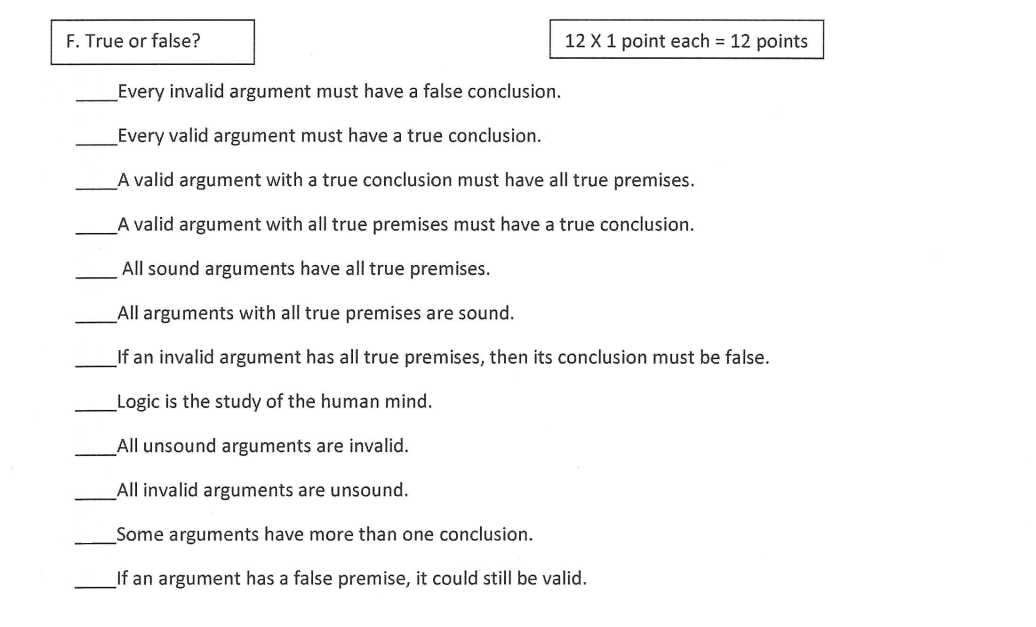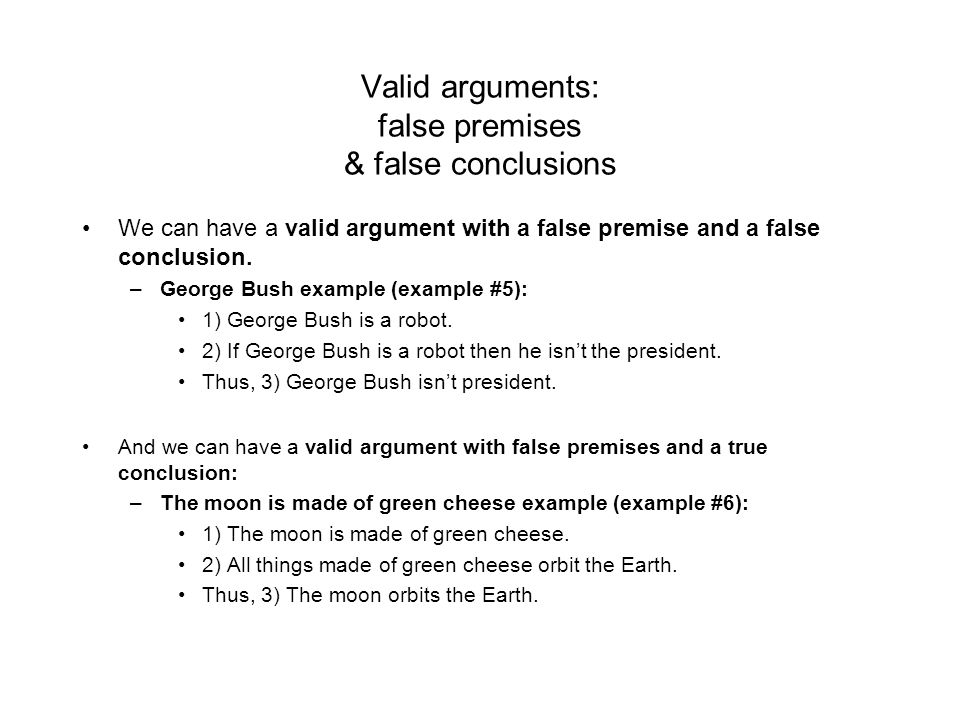It is valid and. This is simply the definition of the word sound in logic.

Solved F True Or False 12 X 1 Point Each 12 Points Every Chegg Com
An invalid argument may have true or false premises and a true or false conclusion.

. Therefore a sound argument always has true premises and true conclusions whereas an unsound argument may have both. All premises are true and conclusion follows from the premises during sound and valid arguments. A sound argument may have a false conclusion.
If a deductive argument has true premises and a false conclusion it is necessarily invalid. All sound arguments are valid but not all valid arguments are sound. It has all true premises.
This problem has been solved. The validity of an argument is not a guarantee of the truth of its conclusion. The conclusion of a valid argument with one or more false premises may be true or false.
All mammals are animals. A sound argument must have a true conclusion. All sound arguments are valid arguments.
A strong argument may have false premises and a probably false conclusion. A sound argument may have a false conclusion. So any argument with false premisses is valid.
If a deductive argument is valid that means the reasoning process behind the inferences is correct and there are no fallacies. When the logic of the argument is correct the argument is termed valid. When a valid argument has a false conclusion it must also have at least one false premise.
Since it is valid the argument is such that if all the premises are true then the conclusion must be true. 1 See answer Advertisement Advertisement shjsmbee8874 is waiting for your help. A strong argument may have false premises and a probably false conclusion.
Logic seeks to discover the forms that make arguments valid. A sound argument is one that is not only valid but begins with premises that are actually true. A sound argument is an argument that is both valid and factually correct.
If the conclusion of an argument follows from the definition of a word used in a premise then the argument is deductive. A strong argument may have true premises and a probably false conclusion. A sound argument may be invalid.
All men are mortal. A deductive argument is sound when. If a valid argument has a false conclusion.
A valid argument may have false premises with either a true or a false conclusion. All cats are animals. It is never th case that an argument is valid and has all true premises but its conclusion is false.
A cogent argument must be inductively strong. A valid argument may have false premises and a false conclusion. A is a deductive argument that is valid and has all true premises.
A valid argument may have false premises that render it inconclusive. All cats are mammals. Even an invalid and unsound argument can have a true statement as its conclusion its just that the conclusion may not follow from the premises or that the premises that the conclusion is.
Validity does not help determine whether the premisses are true nor do we care. A cogent argument may have a probably false conclusion. One of the ways validity is defined is an argument such that if the premisses are true the conclusion cannot be false.
This argument is sound because 1 it is valid the premises support the conclusion by necessity and 2 all of the premises are actually true. The validity of an argument depends however not on the actual truth or falsity of its premises and conclusions but solely on whether or not the argument has a valid logical form. Identify the consequent of the statement If a snake is a reptile then it is not a mammal.
Sound arguments prove that their conclusions are true. Proper logic states all valid arguments are sound arguments. Hence this is the key difference between sound and unsound argument.
If the premises of such an argument are true then it is impossible for the conclusion not to be true. Question 8 A sound argument may have a false conclusion. A valid argument may have a false premise and a false conclusion.
A sound argument may have a false premise. Some arguments with false premises and. Logic seeks to discover the valid forms the forms that make.
A sound argument may have a false conclusion. A sound argument must have both a valid form and true premises. And all of its premises are true.
A valid argument can have a false conclusion as long as the premisses are not all true. T Socrates is a man. A sound argument is an argument that is valid and has true premises while an unsound argument is an argument that is invalid or has at least one false premises.
Thus a valid argument with a false conclusion will also be unsound. A sound argument may have a false premise A sound argument is never deductively valid A sound argument is true A sound argument always has a true conclusion 5 points. Some examples of sound arguments.
Show transcribed image text. If an argument is sound then it is valid and has all true premises. If a deductive argument has true premises and a false conclusion then it must be invalid.
Quiz 1-4 2020_01_03 20_00_51 UTCdoc. A statement may legitimately be spoken of as valid or invalid False. Valid arguments can have false premises.
Add your answer and earn points. T Hence Socrates is mortal. A sound argument really does have all true premises so it does actually follow that its conclusion must be true.
Question 9 An unsound argument may be invalid. The only combination that is ruled out is a valid argument with true premises and a false conclusion. A valid argument may still have a false conclusion.
All reptiles are not mammals B. If snake is a reptile C. If the conclusion is false then either the logic was invalid or else one or more of the premises was incorrect.
A sound argument is both valid. When we construct our arguments we must aim to construct one that is not only valid but sound. The validity of an argument is not a guarantee of the truth of its conclusion.
A form of argument is valid if and only if the. Note that in all four of the examples above the conclusion can be true. If an argument has true premises and a true.
A valid argument may have a false premise and a false conclusion. Question 10 Propositions are statements about the world. See the answer See the answer See the answer done loading.
A sound argument may have a false conclusion.

Difference Between Sound And Unsound Argument Compare The Difference Between Similar Terms

Deductive Validity Truth Preserving The Conclusion Logically Follows From The Premises It Is Logically Impossible For The Premises To Be True And The Ppt Video Online Download

Introduction To Philosophy Lecture 2 A Deeper Look At Arguments Ppt Download

0 Comments